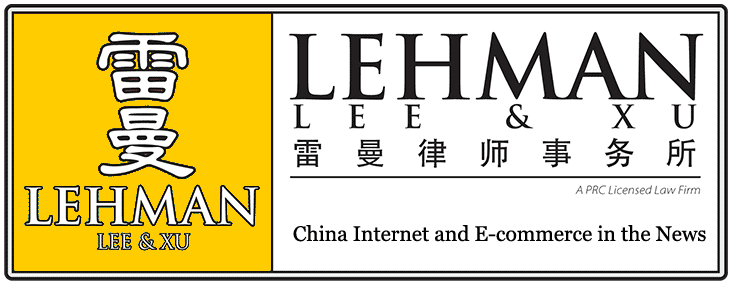
 |
|
LEHMAN, LEE & XU China Lawyers
|
|
China Internet and E-commerce In The News
|
|
September 2013
|
The China Law News keeps you on top of business, economic and political events in the China. |
|
|
|
In the News |
China monitors online chatter as users threaten state hold on the internet |
In the offices of China's Communist party newspaper, rows of analysts sit at computer screens poring over data that is stripped off the internet. Every comment made by the 591 million Chinese "netizens" is analyzed at the People's Daily Online Public Opinion Monitoring Centre, with summaries sent in real time to party leaders. More than ever before, China's rulers are actually listening to their people, reacting quickly to contain potential crises that could threaten one-party control. With its ability to control the internet increasingly challenged, China's Communist party has had to change its game.
|
New law on customer data protection in China impacting telecom and internet companies |
The Rules Regarding the Protection of Personal Information of Telecommunications and Internet Users (the “Rules”) were adopted and announced on July 16, 2013 by the Chinese Ministry of Industry and Information Technology (the “MIIT”), and will take effect on Sept. 1, 2013. Spurred by the booming of the telecom and Internet business in China, the privacy risk that telecommunications and Internet users are faced with on a daily basis has become, unfortunately, greater than ever in recent years. The Rules, as the first regulation specifically formulated to protect the personal information in e-commerce applications, will become a guideline for all regulations under the MIIT regarding the protection of personal information in the field of e-commerce. Entities subject to the regulation of the Rules The Rules expressly limit the scope of entities subject to regulation. The Rules only apply to the telecom service providers (the “TSP”) and the Internet content service providers (the “ICP”). Principles regarding the collection and use of personal Information The principles of “legality, propriety and necessity,” as provided in the Rules regarding the collection and use of the personal information, are exactly the same with that in the Decision. In addition, the Rules provide that the personal information collector shall be responsible for the security of the collected information. Key requirements regarding the collection and use of personal information Some of the requirements set forth in the Rules are mere reiterations of the requirement listed in the Decision, including: Furthermore, the Rules provide some new requirements to regulate the TSP and the ICP. The ones listed below are especially worth paying attention to: The TSP and the ICP shall formulate and publish detailed rules regarding the collection and use of personal information, and post them at their service premises or on related websites. The TSP and the ICP shall not collect any personal information which is not necessary for the furnishing of their service, or use such information for any purposes unrelated to their service, or collect information through fraud, misleading, coercion or any other methods prohibited by law. The TSP and the ICP shall stop collecting or using the personal information upon termination of service, and shall upon such termination provide the users with an option to cancel their accounts; and In addition to informing the users of the reason, measure and scope of the collection and use of information as mentioned above, the TSP and the ICP shall also inform the users of the measures used to inquire or change their information, and the consequence of refusing to provide such personal information. Responsibility to third-party contractors Currently a lot of the TSP and ICP have outsourced part of their service to third party contractors. In this regard the Rules expressly state that the TSP or ICP shall supervise and manage such contractors and ensure their compliance with the Rules. For example, even if a cloud computing company outsources the cloud-saving service to a third party, this cloud computing company is still obligated to make sure that the collection and use of the customers’ personal information by such third party will not violate the Rules. Penalties Penalties for violation of the Rules shall be limited to warnings and fines. The maximum amount of fine a regulatory administration is allowed to impose will be RMB 30,000. The Rules also provide that any violation thereunder shall be recorded into the Credit Files established and updated by the MIIT, which will also be made public. End notes The Rules have made significant progress in protecting the private information of telecommunications and Internet users by setting forth specific rules and policies to regulate the e-commerce market. However, the penalties thereunder are comparatively light considering the amount of damage any violation of the Rules may potentially cause. Thus the Rules alone may not be enough to deter all privacy infringing acts. We hope that in addition to the Rules more laws and regulations imposing civil or criminal liabilities proportional to the amount of damage caused in the field of e-commerce will be drafted so as to provide a clearer guide to e-commerce business operators and customers. http://www.lexology.com/library/detail.aspx?g=0db24949-a2c7-40cc-9c92-d213334edce5
|
|
|
|
|